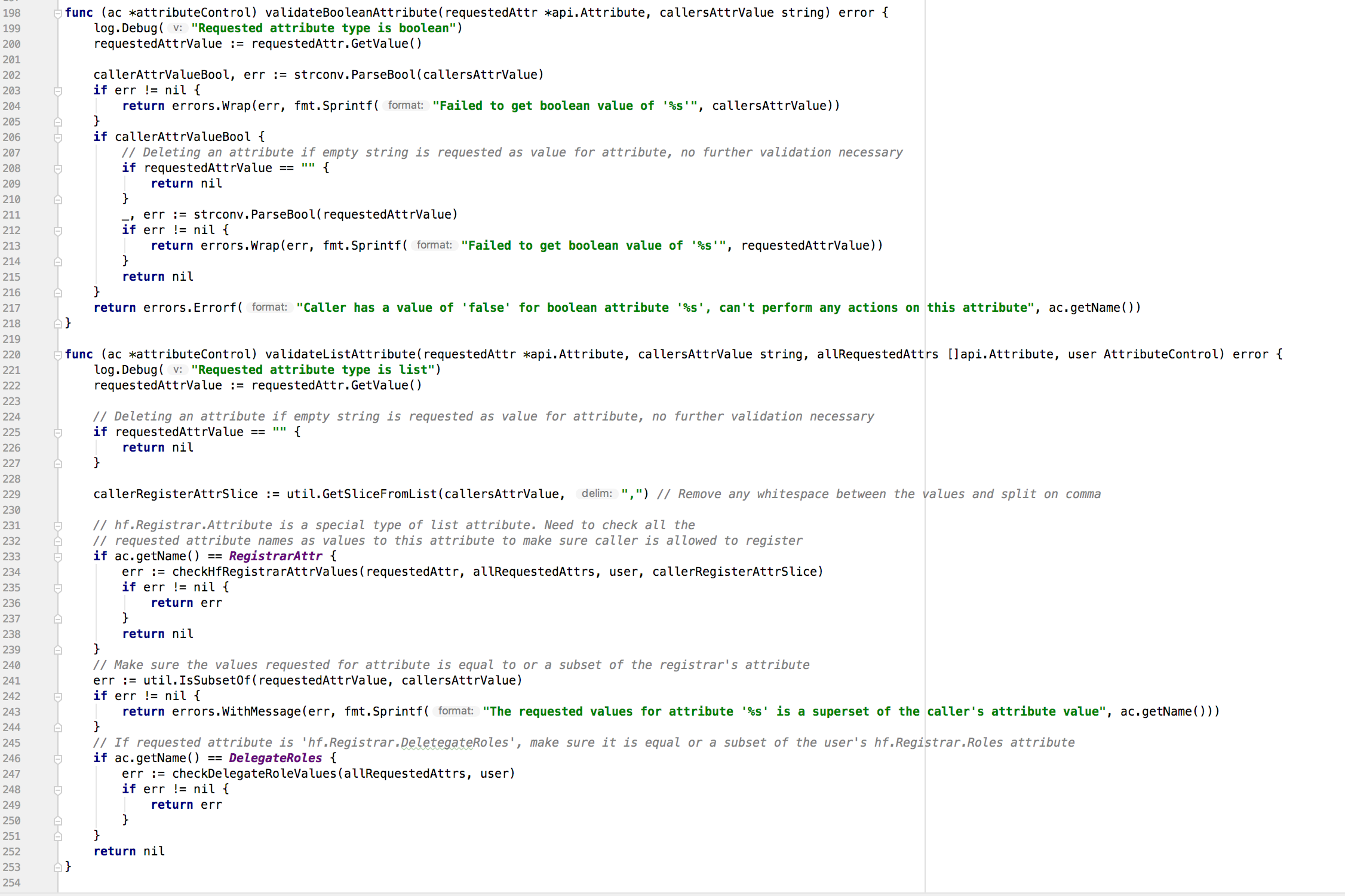近期在研究Fabric CA 创建用户,的时候发现很多隐含规则
通过官方文档,我们知道 fabric-ca 可以带有如下几个以hf.开头的属性,我们暂且称之为系统属性
| Name | Type | Description |
|---|
| hf.Registrar.Roles | List | List of roles that the registrar is allowed to manage |
| hf.Registrar.DelegateRoles | List | List of roles that the registrar is allowed to give to a registree for its ‘hf.Registrar.Roles’ attribute |
| hf.Registrar.Attributes | List | List of attributes that registrar is allowed to register |
| hf.GenCRL | Boolean | Identity is able to generate CRL if attribute value is true |
| hf.Revoker | Boolean | Identity is able to revoke a user and/or certificates if attribute value is true |
| hf.AffiliationMgr | Boolean | Identity is able to manage affiliations if attribute value is true |
| hf.IntermediateCA | Boolean | Identity is able to enroll as an intermediate CA if attribute value is true |
现象一:Boolean类型系统属性
首先,我们用admin创建账户test_a,
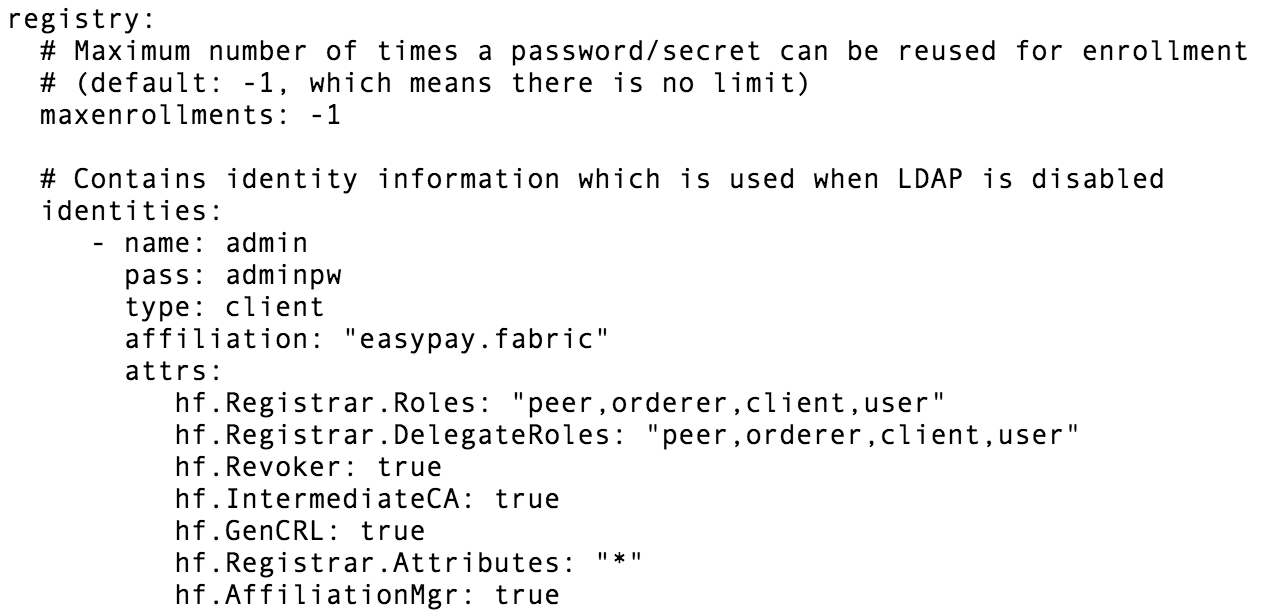
命令如下:
fabric-ca-client register -d \ --id.name test_a \ --id.secret test_a_pw \ --id.type client \ --id.affiliation easypay.fabric \ --id.attrs '"hf.Registrar.Roles=client,user"' \ --id.attrs '"hf.Registrar.DelegateRoles=client,user"' \ --id.attrs '"hf.Registrar.Attributes=*"' \ --id.attrs hf.Revoker=true \ --id.attrs hf.AffiliationMgr=true \ --id.attrs hf.IntermediateCA=true \ --id.attrs hf.GenCRL=false
即,设置test_a用户hf.GenCRL=false,结果如下:
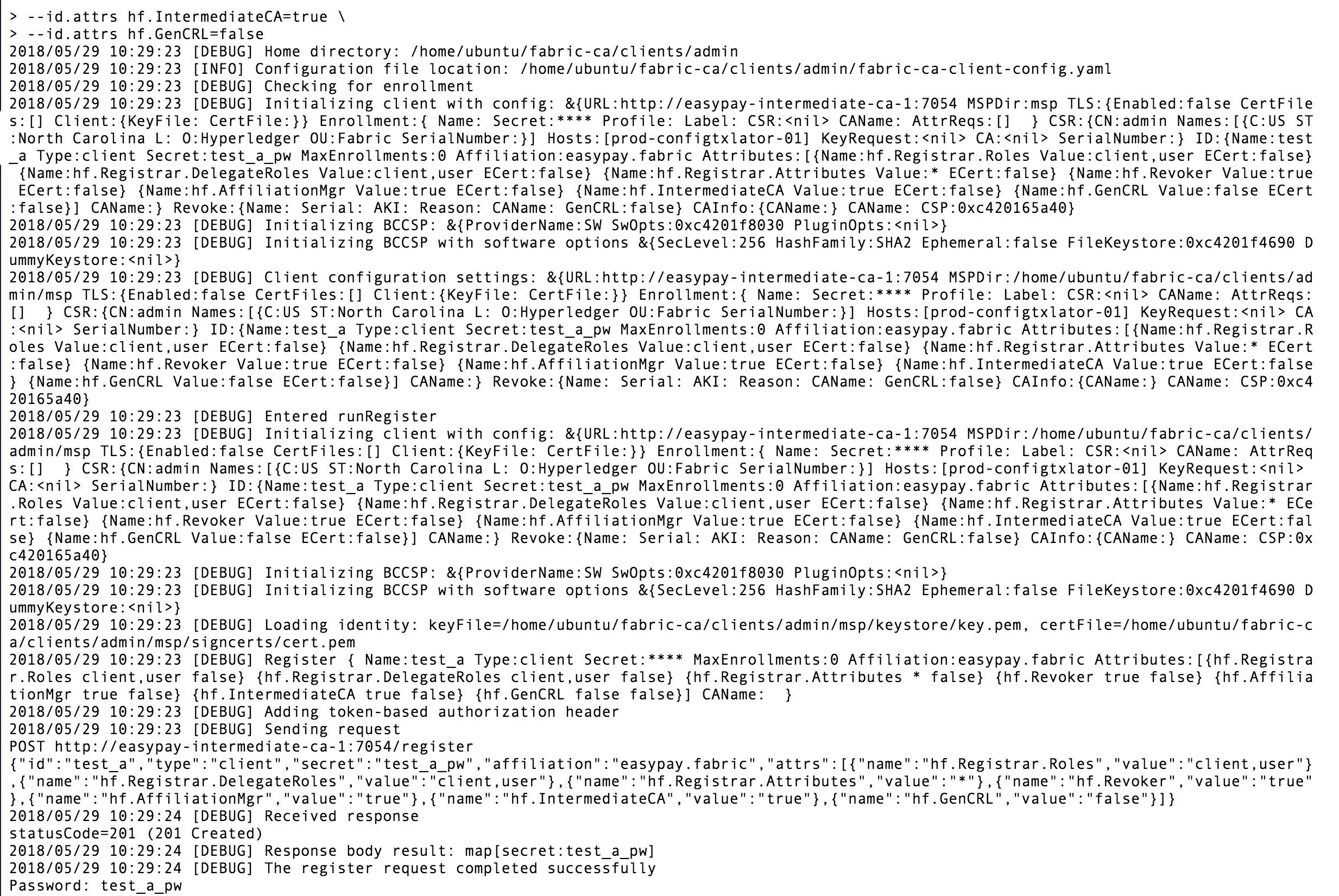
然后我们尝试用test_a账户分别创建以下几个账户(注意是用test_a账户,而不是admin账户)
- test_a_a,设置test_a_a用户
hf.GenCRL=true:
fabric-ca-client register -d \ --id.name test_a_a \ --id.secret test_a_a_pw \ --id.type client \ --id.affiliation easypay.fabric \ --id.attrs '"hf.Registrar.Roles=client,user"' \ --id.attrs '"hf.Registrar.DelegateRoles=client,user"' \ --id.attrs '"hf.Registrar.Attributes=*"' \ --id.attrs hf.Revoker=true \ --id.attrs hf.AffiliationMgr=true \ --id.attrs hf.IntermediateCA=true \ --id.attrs hf.GenCRL=true
结果创建失败,会报权限错误,如下所示:
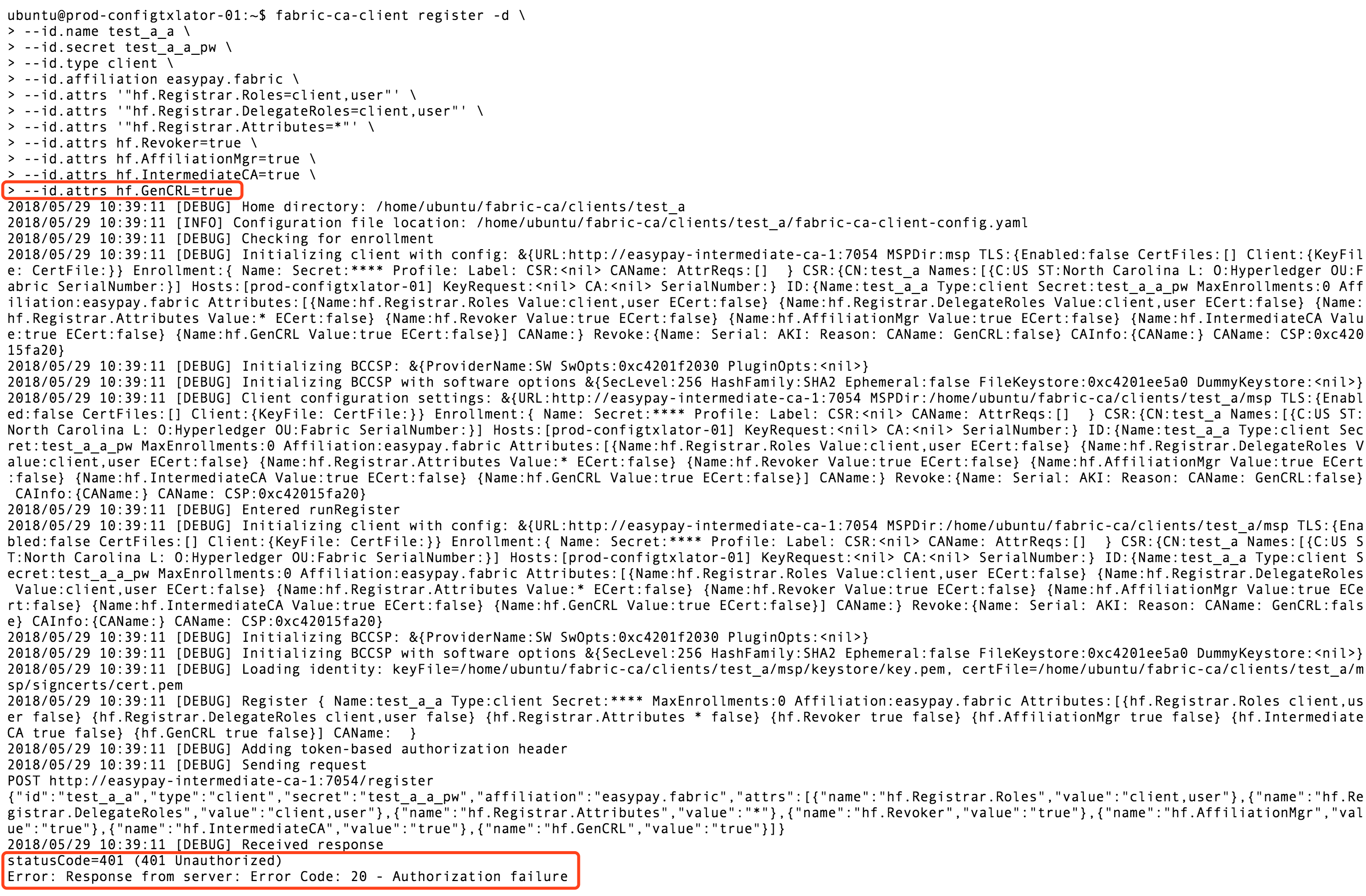
- test_a_b,设置test_a_b用户
hf.GenCRL=false:
fabric-ca-client register -d \ --id.name test_a_b \ --id.secret test_a_b_pw \ --id.type client \ --id.affiliation easypay.fabric \ --id.attrs '"hf.Registrar.Roles=client,user"' \ --id.attrs '"hf.Registrar.DelegateRoles=client,user"' \ --id.attrs '"hf.Registrar.Attributes=*"' \ --id.attrs hf.Revoker=true \ --id.attrs hf.AffiliationMgr=true \ --id.attrs hf.IntermediateCA=true \ --id.attrs hf.GenCRL=false
结果同上:
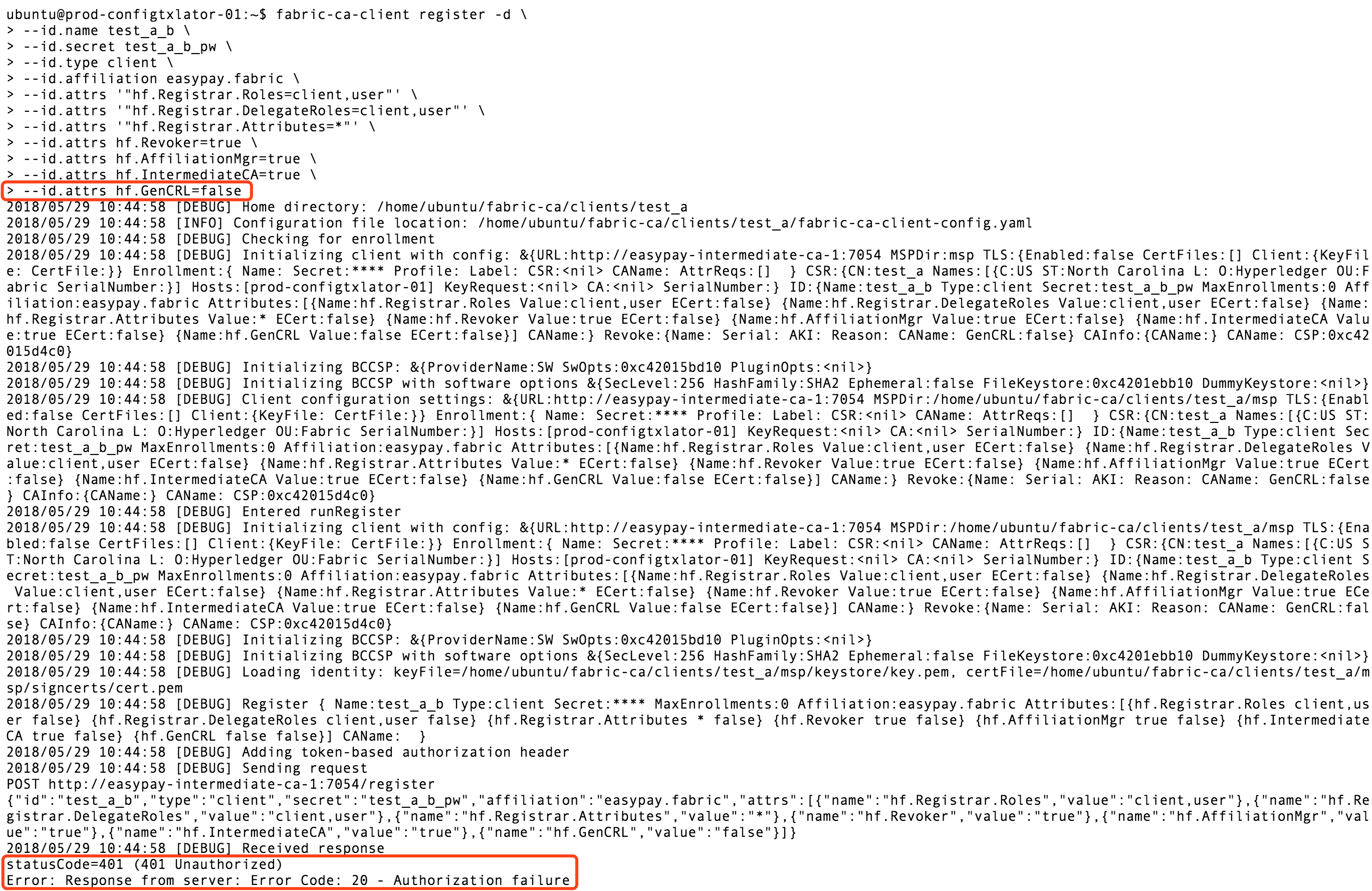
- test_a_c,不设置test_a_c用户
hf.GenCRL属性:
fabric-ca-client register -d \ --id.name test_a_c \ --id.secret test_a_c_pw \ --id.type client \ --id.affiliation easypay.fabric \ --id.attrs '"hf.Registrar.Roles=client,user"' \ --id.attrs '"hf.Registrar.DelegateRoles=client,user"' \ --id.attrs '"hf.Registrar.Attributes=*"' \ --id.attrs hf.Revoker=true \ --id.attrs hf.AffiliationMgr=true \ --id.attrs hf.IntermediateCA=true
结果创建成功,如下:
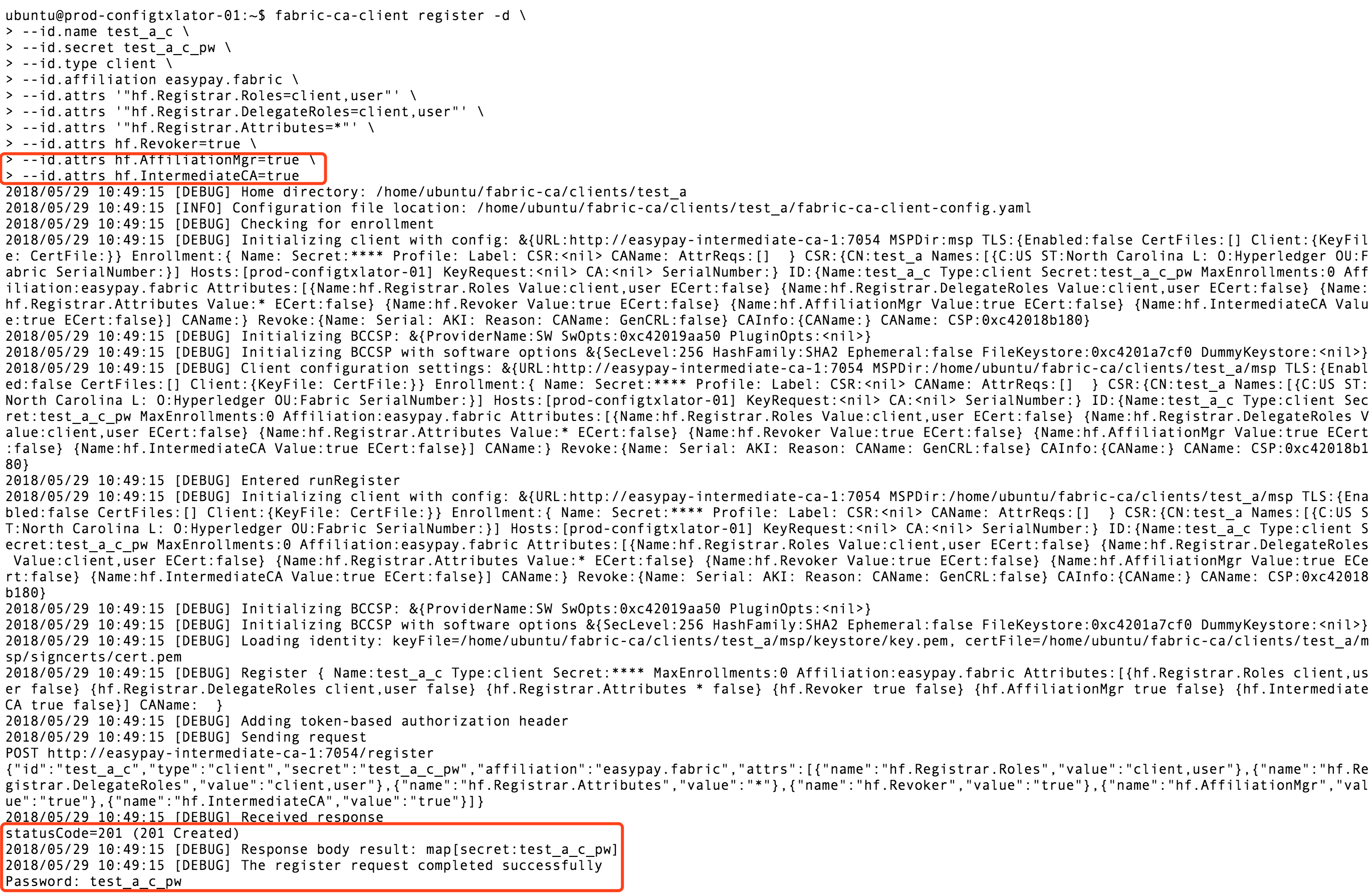
其他几个布尔类型属性,hf.Revoker,hf.AffiliationMgr,hf.IntermediateCA,都有类似现象,即,上级id这些布尔属性如果设置为false(或者不设置),则所创建是下级id都不能带有对应的这个几个布尔类型的系统属性
现象二:hf.Registrar.Roles的约束
刚才创建的test_a身份,id.type=client,hf.Registrar.Roles=client,user, 如果我们用test_a注册一个id.type=peer或者id.type=orderer的身份 结果会怎样呢?大家应该都想得到,肯定是失败,这里我就不做测试了
备注:fabric-ca 1.1 版本 hf.Registrar.Roles 属性只支持client,user,peer,orderer四种,1.2版本即将支持自定义角色,详见:https:/jira.hyperledger.org/browseFAB-7882
相关资料截图:
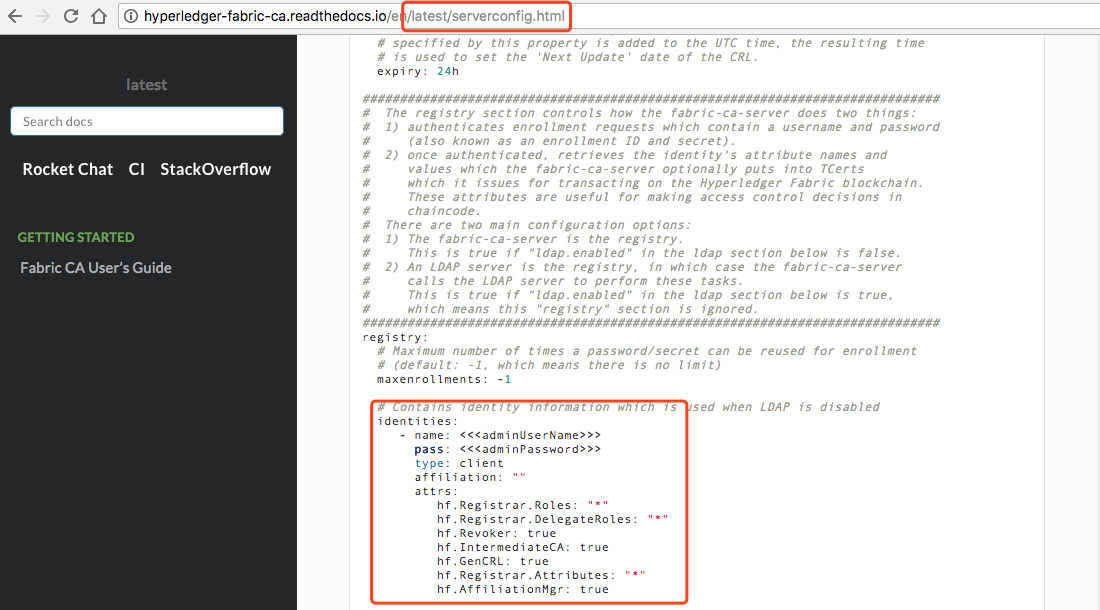
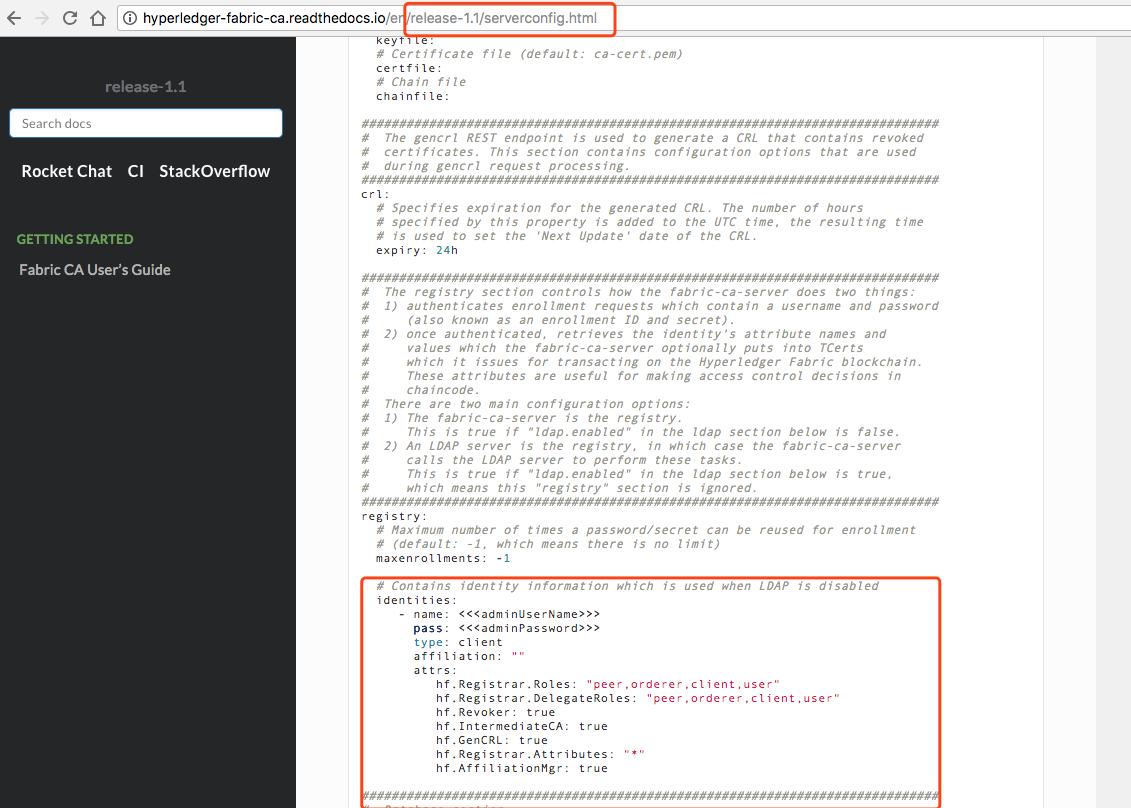
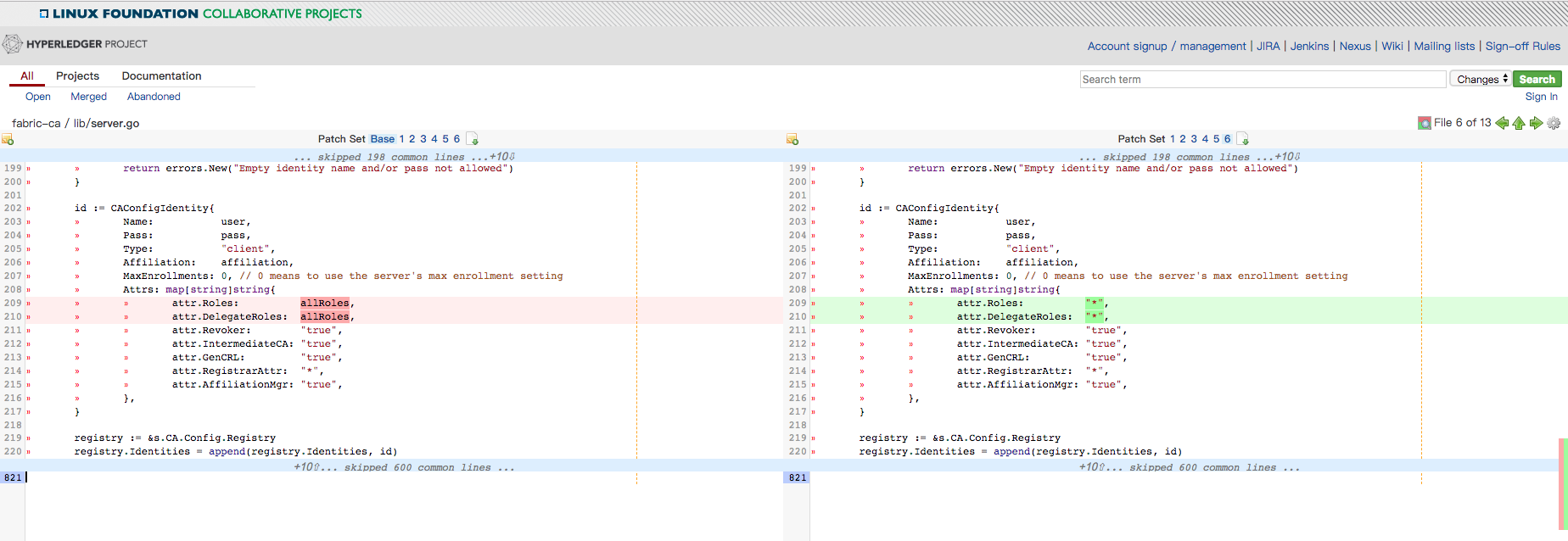
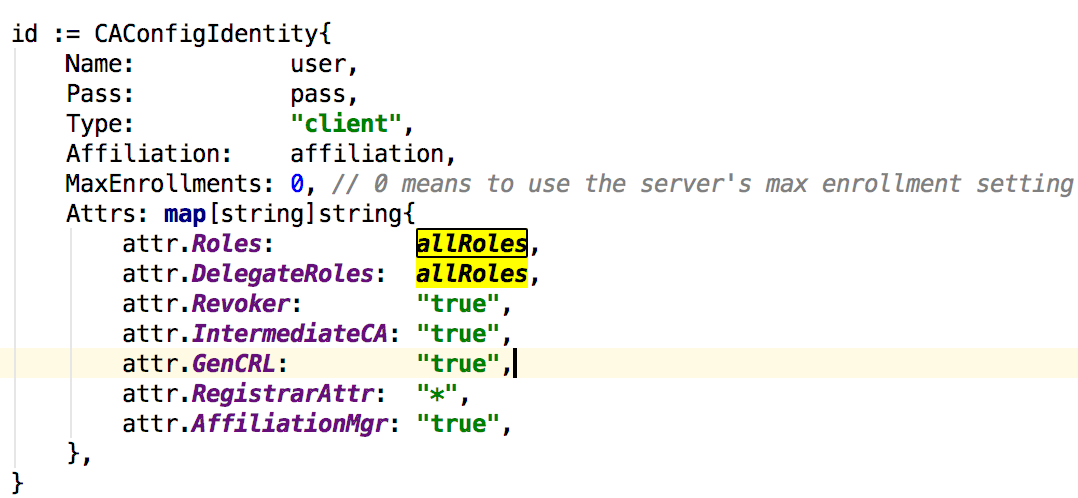

用 test_a 用户创建一个 test_a_d身份,设置test_a_d属性hf.Registrar.Roles=client,user,peer ,如下:
fabric-ca-client register -d \ --id.name test_a_d \ --id.secret test_a_d_pw \ --id.type client \ --id.affiliation easypay.fabric \ --id.attrs '"hf.Registrar.Roles=client,user,peer"' \ --id.attrs '"hf.Registrar.DelegateRoles=client,user,peer"' \ --id.attrs '"hf.Registrar.Attributes=*"' \ --id.attrs hf.Revoker=true \ --id.attrs hf.AffiliationMgr=true \ --id.attrs hf.IntermediateCA=true
结果创建失败,如下:
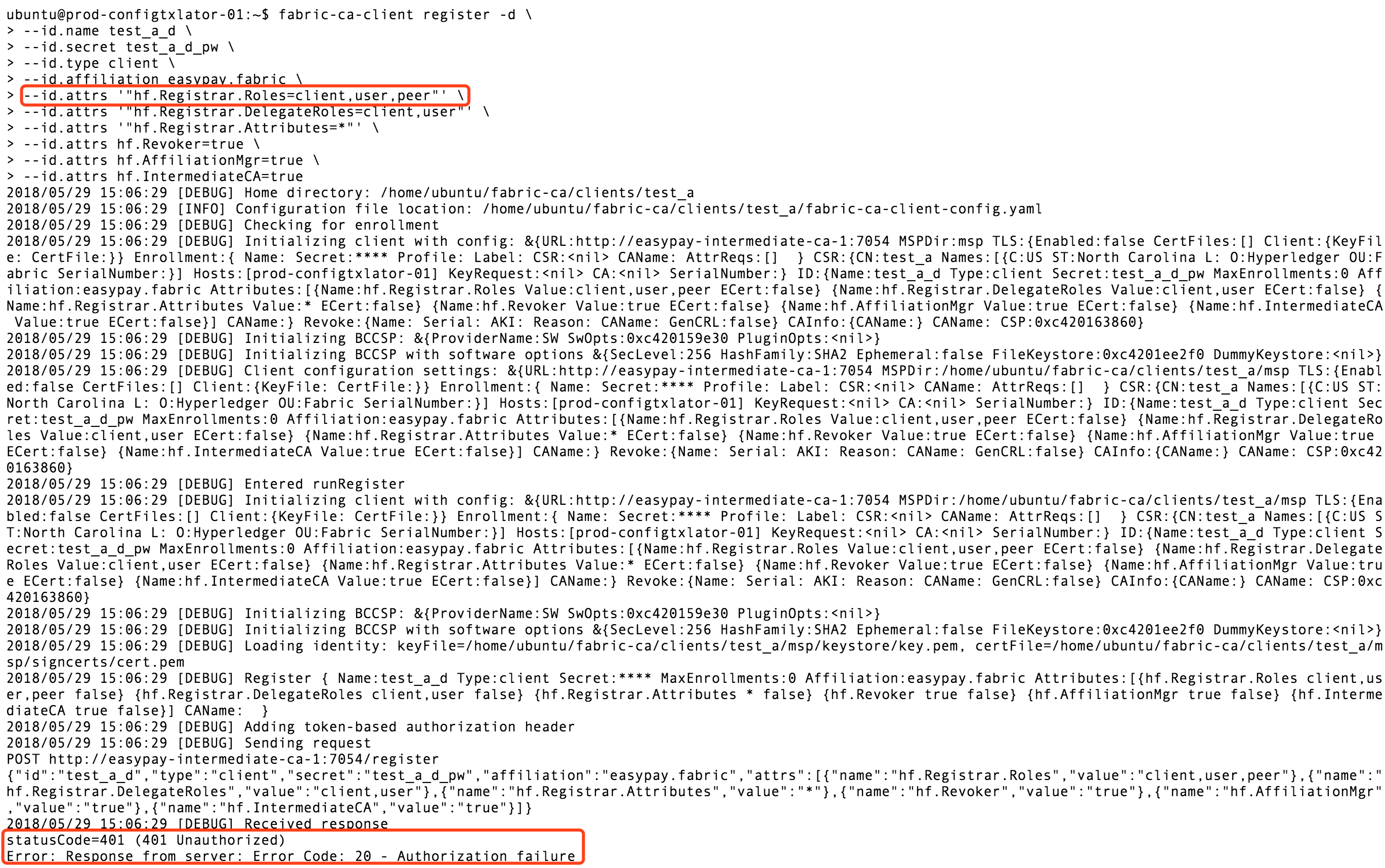
可以继续往下测试,可以发现,当test_a身份的属性hf.Registrar.Roles=client,user ,往下用test_a身份创建的子身份的f.Registrar.Roles属性值都不能超过client,user的范围
再用 test_a 用户创建一个 test_a_e身份,设置test_a_e 属性id.type=peer ,如下:
fabric-ca-client register -d \ --id.name test_a_e \ --id.secret test_a_e_pw \ --id.type peer \ --id.affiliation easypay.fabric \ --id.attrs '"hf.Registrar.Roles=client,user"' \ --id.attrs '"hf.Registrar.DelegateRoles=client,user"' \ --id.attrs '"hf.Registrar.Attributes=*"' \ --id.attrs hf.Revoker=true \ --id.attrs hf.AffiliationMgr=true \ --id.attrs hf.IntermediateCA=true
结果创建失败,错误信息如下:
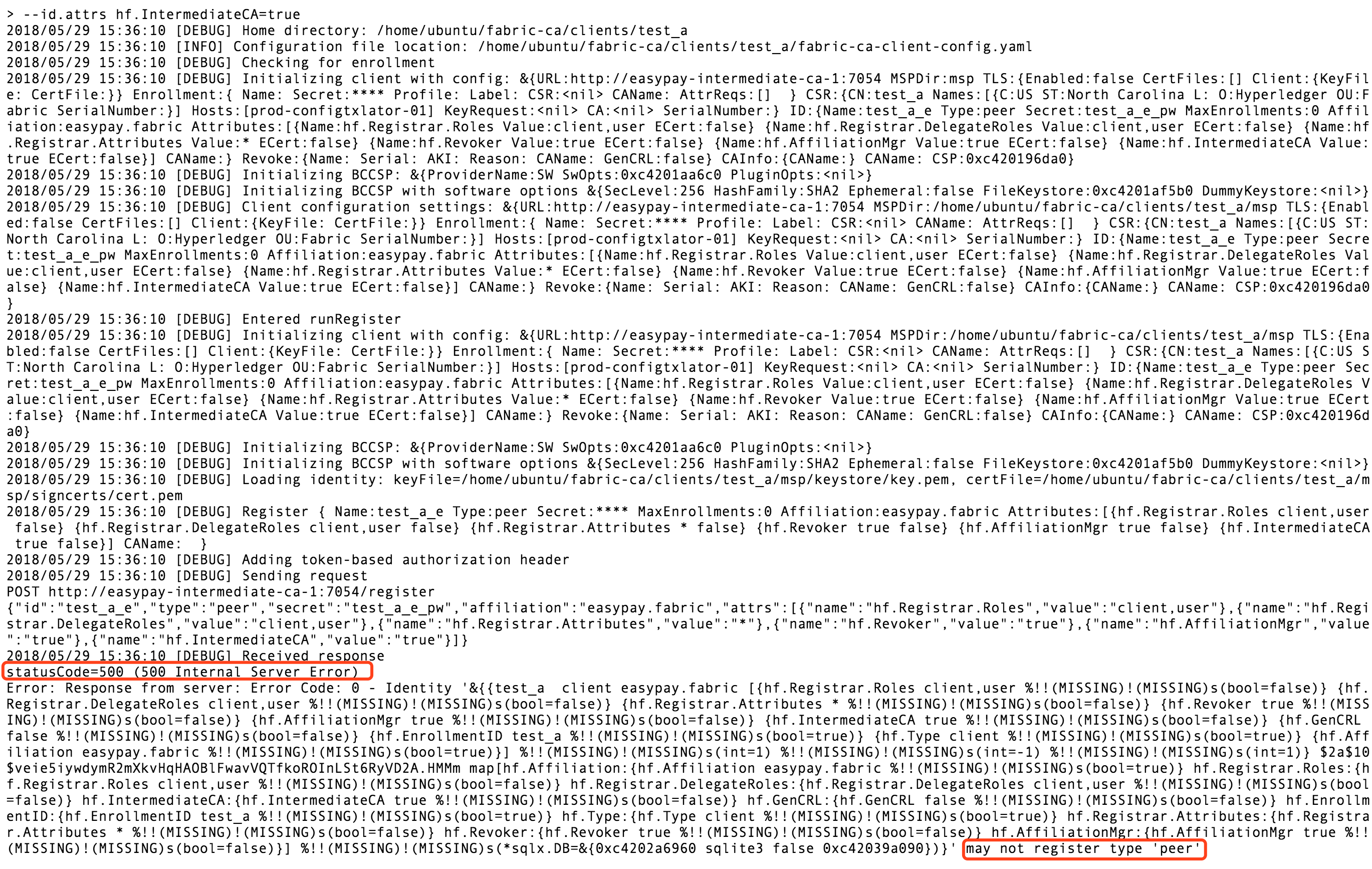
子 id 的id.type属性值也受到上级id的hf.Registrar.Roles属性值的约束
现象三:hf.Registrar.Attributes 属性的约束
尝试用 admin 身份 创建 test_b ,添加hf.key=value
fabric-ca-client register -d \ --id.name test_b \ --id.secret test_b_pw \ --id.type client \ --id.attrs hf.key=value
即使admin身份hf.Registrar.Attributes=*,还是创建失败,结果如图
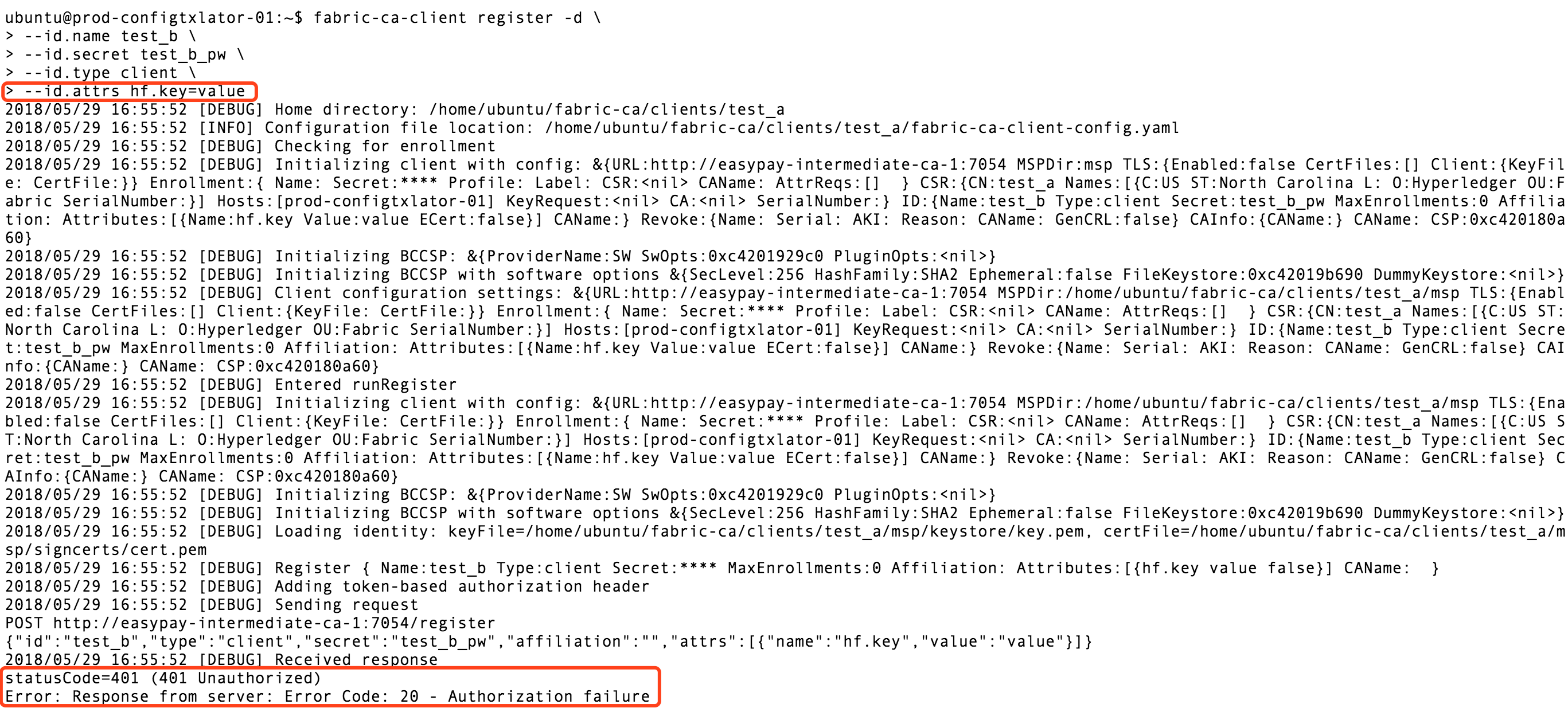
再尝试用 admin 身份 创建 test_c,添加hf=value
fabric-ca-client register -d \ --id.name test_c \ --id.secret test_c_pw \ --id.type client \ --id.attrs hf=value
创建成功,结果如图
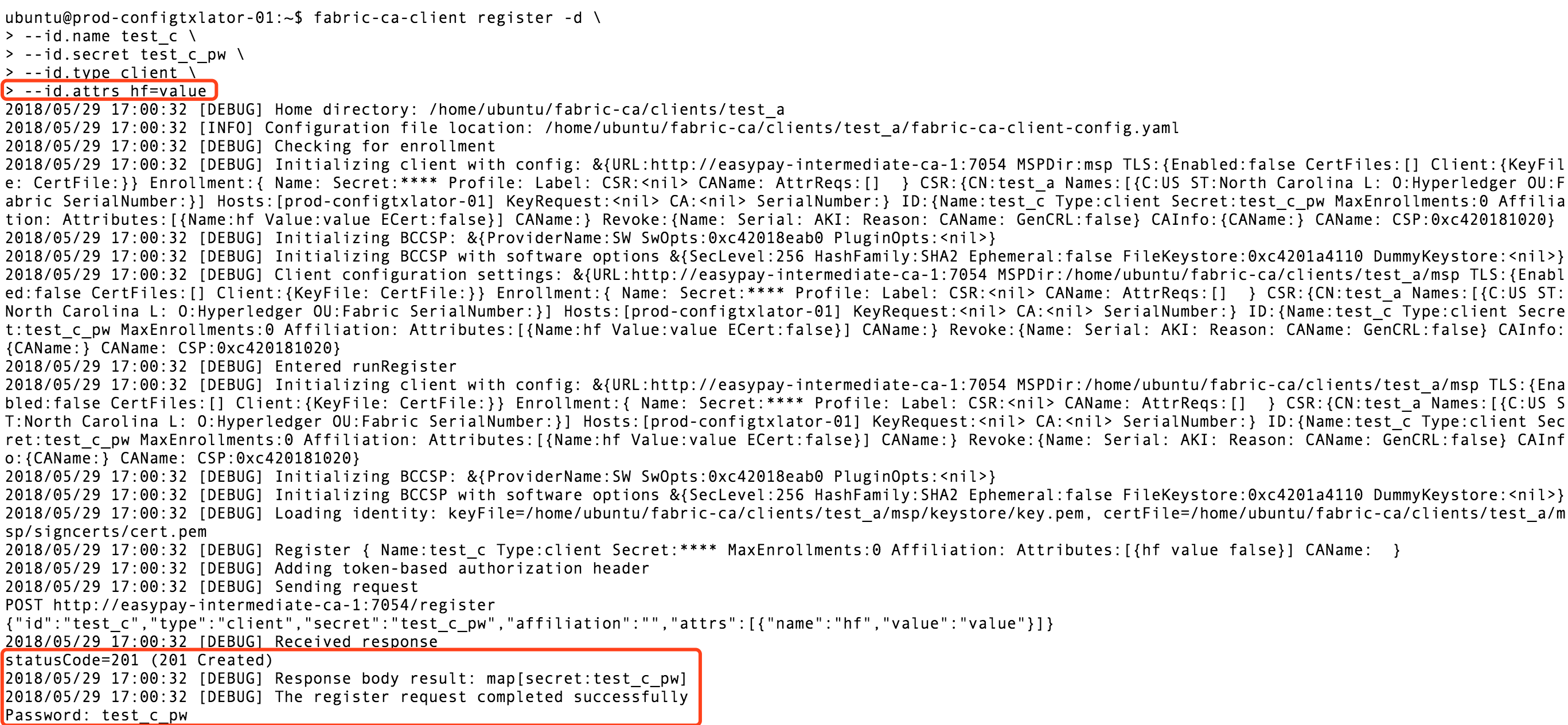
总结下来,有以下几点规律:
-
上级id的hf.Registrar.Attributes值可以约束它所创建的子级id能添加的属性,但是带hf.的除外,带hf.开头的会被当做系统属性,区别对待
-
从上级往下,所带的属性约束只能是逐渐收敛的,不能发散
相关代码
感兴趣可以详细研究一下源代码 相关部分代码可以参见:https://github.com/hyperledger/fabric-ca/blob/release-1.1/lib/attr/attribute.go
